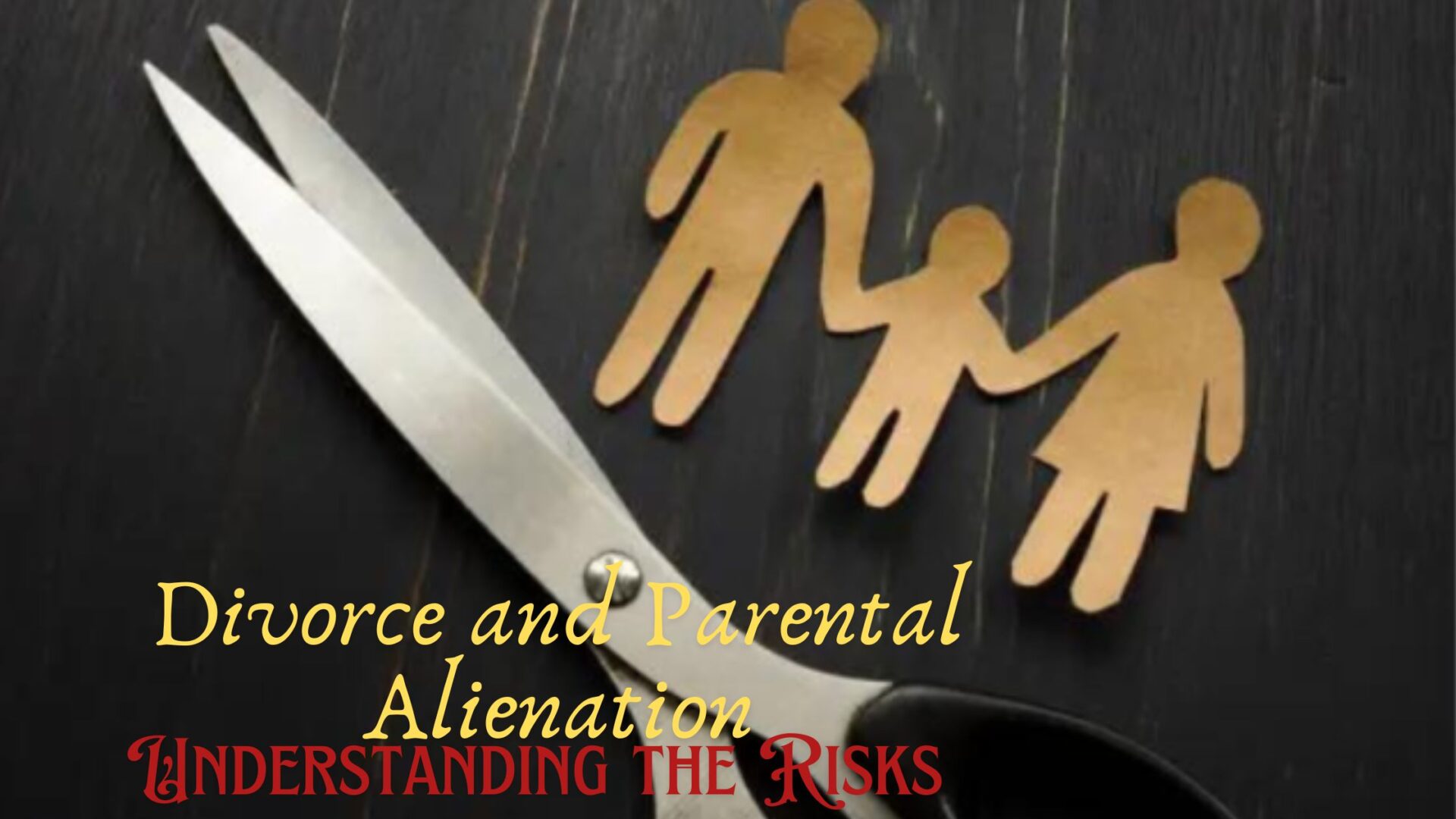Introduction
Divorce and Parental Alienation: Understanding the Risks

Divorce is a challenging and often emotionally charged process, especially when children are involved. In some cases, a troubling phenomenon known as parental alienation can emerge, causing significant harm to the children and the relationships they have with one or both parents. In this article, we’ll delve into the complex issue of parental alienation, exploring what it is, its potential consequences, and strategies for identifying and addressing this damaging behavior.
Understanding Parental Alienation
Parental alienation refers to the systematic and unwarranted manipulation of a child’s feelings and beliefs about one of their parents by the other parent. It often involves tactics aimed at discrediting or vilifying one parent, resulting in the child aligning with the alienating parent and rejecting the other. This can manifest in various ways, including:
- Negative Influence: The alienating parent may speak negatively about the other parent in front of the child, portraying them as irresponsible, unloving, or dangerous.
- Restrictions on Contact: The alienating parent may limit or obstruct the child’s contact with the other parent, making visitation difficult or even impossible.
- False Accusations: Accusations of abuse, neglect, or harm may be fabricated against the other parent to damage their reputation and relationship with the child.
Potential Consequences of Parental Alienation
Parental alienation can have profound and lasting effects on children and the family dynamic. Some potential consequences include:
- Emotional Distress: Children subjected to parental alienation may experience anxiety, depression, and confusion as they grapple with divided loyalties and conflicting emotions.
- Damaged Parent-Child Relationships: Alienation can lead to strained or broken relationships between the child and the targeted parent, often lasting well into adulthood.
- Identity Confusion: Children may struggle to form a clear sense of identity when manipulated into adopting one parent’s perspective over the other’s.
- Long-Term Effects: The effects of parental alienation can persist into adulthood, affecting the child’s ability to form healthy relationships and trust others.
Identifying and Addressing Parental Alienation
Early intervention is crucial in addressing parental alienation. Here are steps to consider if you suspect or encounter this behavior:
- Recognize the Signs: Be aware of the signs of parental alienation, including consistent negative remarks about one parent, reluctance to spend time with a parent, or a sudden change in a child’s attitude toward a parent.
- Seek Professional Help: Engage a family therapist or counselor experienced in dealing with parental alienation. They can provide guidance and interventions to address the issue.
- Maintain Communication: Open, honest, and age-appropriate communication with your child is vital. Encourage them to express their feelings and concerns without fear of judgment.
- Document Behavior: Keep records of instances of alienating behavior, such as text messages, emails, or conversations. These records may be useful in legal proceedings, if necessary.
- Legal Action: In severe cases, it may be necessary to seek legal action to protect your rights as a parent and the well-being of your child.
What are some key strategies and advice for parents seeking to maintain positive and healthy relationships with their adult children?
Maintaining positive and healthy relationships with adult children requires a blend of understanding, communication, and mutual respect. Here are key strategies and advice for parents:

- Open and Nonjudgmental Communication: Keep the lines of communication open. Listen actively to your adult children without judgment, allowing them to express their thoughts, feelings, and concerns freely.
- Respect Boundaries: Recognize that your adult children have their own lives and responsibilities. Respect their boundaries, both physical and emotional. Avoid overstepping or giving unsolicited advice.
- Support Their Independence: Encourage their independence and decision-making. Offer guidance when requested, but allow them the autonomy to make their choices and learn from their experiences.
- Quality Time Together: Make an effort to spend quality time together. Plan activities or outings that both you and your adult children enjoy. Shared experiences can strengthen bonds.
- Celebrate Achievements: Acknowledge and celebrate their achievements, whether big or small. Show genuine pride in their accomplishments to boost their self-esteem.
- Be Available in Times of Need: Be there for your adult children when they need emotional support or advice. Offering your assistance during challenging times can strengthen your relationship.
- Respect Differences: Embrace differences in opinions, values, and lifestyles. It’s natural for adult children to have their own perspectives, and respecting those differences fosters harmony.
- Apologize When Necessary: If you make a mistake or have a disagreement, be willing to apologize and make amends. A sincere apology can go a long way in maintaining a positive relationship.
- Stay Updated: Show interest in their lives by asking about their interests, friends, and experiences. Staying updated demonstrates your care and involvement.
- Celebrate Traditions: Continue family traditions and create new ones. These shared rituals can help strengthen your family’s bonds over time.
- Avoid Unwanted Parenting: Resist the urge to parent or control your adult children’s lives. Treat them as equals and respect their ability to make decisions.
- Seek Mutual Activities: Find common hobbies or interests you can pursue together. Whether it’s a shared hobby or a mutual cause, such activities can deepen your connection.
- Avoid Criticism: Be cautious about offering unsolicited criticism or negative feedback. Instead, focus on constructive and supportive communication.
- Express Love and Affection: Don’t hesitate to express your love and affection regularly. Verbal affirmations and physical gestures can convey your feelings effectively.
- Give Space When Needed: Recognize that your adult children may need space at times. Allow them to retreat and recharge when necessary, respecting their need for solitude.
By following these strategies and maintaining a respectful, understanding, and supportive approach, parents can foster positive and enduring relationships with their adult children, creating a strong foundation for continued closeness and connection.
How can therapy help in cases of parental alienation?
Therapy can play a crucial role in addressing and
mitigating the effects of parental alienation. Here are several ways therapy
can help:
1. Providing a Neutral Space for the Child
Therapy offers a safe and neutral environment where the
child can express their feelings without fear of judgment or influence from
either parent. This can help the child explore their emotions and thoughts more
openly and honestly.
2. Addressing Underlying Issues
Therapists can help identify and address underlying issues
that may be contributing to the child’s alienation from one parent. This might
include feelings of loyalty conflict, fear, or misunderstanding, and other
psychological or emotional factors.
3. Rebuilding Relationships
Therapists can facilitate sessions aimed at rebuilding and
strengthening the relationship between the child and the alienated parent.
Through guided interactions and activities, the therapist can help both parties
communicate more effectively and rebuild trust.
4. Supporting the Alienated Parent
Therapy can provide the alienated parent with emotional
support and coping strategies. It can also help them develop effective ways to
interact with their child, respond to alienation behaviors, and manage their
own emotional responses.
5. Educating Both Parents
Therapy can educate both parents about the harmful effects
of parental alienation on the child. It can promote awareness and encourage
both parents to prioritize the child’s well-being over their conflicts.
6. Implementing Behavioral Interventions
Therapists can work with the child and the family to
implement specific behavioral interventions designed to reduce alienation. This
might include setting boundaries, improving communication skills, and creating
positive shared experiences.
7. Family Therapy
Family therapy sessions can involve both parents and the
child, helping to address family dynamics that contribute to alienation. This
holistic approach can promote a healthier family environment and encourage
cooperative co-parenting.
8. Mediation and Conflict Resolution
Therapists trained in mediation can assist in resolving
conflicts between the parents that may be exacerbating the alienation. By
facilitating constructive dialogue, therapists can help parents find common
ground and work towards co-parenting solutions.
9. Developing Empathy and Understanding
Therapy can help the child develop empathy and
understanding for the alienated parent by exploring the parent’s perspective
and experiences. This can reduce feelings of resentment and hostility.
10. Monitoring Progress
Therapists can regularly monitor the child’s emotional and
psychological well-being, adjusting therapeutic approaches as needed. They can
provide ongoing support and interventions to ensure that progress is
maintained.
11. Legal and Court-Involved Therapy
In some cases, court-involved therapy may be ordered.
Therapists can provide reports and recommendations to the court, helping to
inform custody decisions and ensure that the child’s best interests are
prioritized.
Conclusion
Parental alienation is a painful and destructive phenomenon that can have lasting consequences for children and families. By understanding its signs and potential consequences and taking appropriate steps to address it, parents can work to protect their children from the harmful effects of parental alienation and maintain healthy, loving relationships with them. Early intervention and a focus on the child’s well-being are paramount in mitigating the risks associated with this troubling behavior.
FAQs:
Q1: What is parental alienation?
Parental alienation occurs when one parent manipulates a child to reject the other parent, leading to the child’s unjustified estrangement from the alienated parent.
Q2: What are the common signs of parental alienation?
Common signs include:
- The child excessively criticizes the alienated parent.
- The child shows unwavering support for the alienating parent.
- The child has no guilt about their behavior toward the alienated parent.
- The child uses language or phrases that seem borrowed from the alienating parent.
Q3: How can parental alienation affect a child?
Parental alienation can have severe psychological effects on a child, including:
- Emotional distress and confusion.
- Issues with self-esteem and trust.
- Problems forming and maintaining relationships.
- Long-term mental health issues such as depression and anxiety.
References
- Gardner, R. A. (2002). “Parental Alienation Syndrome vs. Parental Alienation: Which Diagnosis Should Evaluators Use in Child-Custody Disputes?” American Journal of Family Therapy. This paper discusses the differences between parental alienation syndrome and general parental alienation, providing a framework for legal and psychological evaluations.
- Kelly, J. B., & Johnston, J. R. (2001). “The Alienated Child: A Reformulation of Parental Alienation Syndrome.” Family Court Review. This article explores the impact of parental alienation on children and suggests interventions to mitigate its effects.
- Warshak, R. A. (2010). “Family Bridges: Using Insights from Social Science to Reconnect Parents and Alienated Children.” Family Court Review. This study provides evidence-based strategies for repairing relationships between alienated children and parents.






